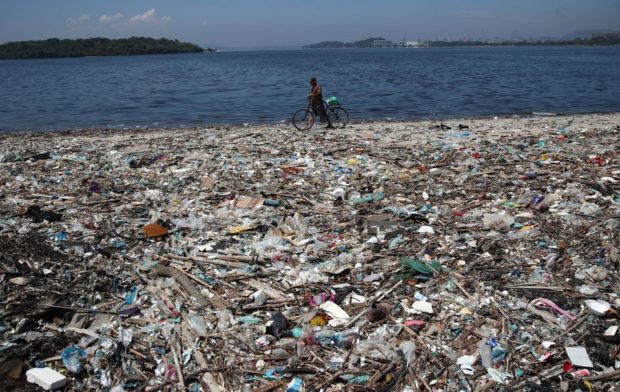Brazilian biologists ‘frightened’ at amount of microplastics in Rio marine life

A man walks by garbage at a polluted beach on the banks of Guanabara Bay in Rio de Janeiro, Brazil March 16, 2022. REUTERS
RIO DE JANEIRO — Biologists in Rio de Janeiro studying the presence of microplastics in marine life off the coast of Brazil’s postcard city have found that the impact of plastic pollution is far worse than they had feared.
The team of biologists don wetsuits and oxygen canisters to dive into the tropical waters around Rio and sample marine life from the ocean. They then measure the quantity of microplastics found inside the organisms in a laboratory.
Plastic objects which end up in the ocean break down into smaller pieces and can eventually end up inside fish and other creatures, researchers told Reuters.
“I was frightened. I knew I would find some [microplastics] but I never thought it would be that much,” said Raquel Neves, a marine biologist at the Federal University of the State of Rio de Janeiro (UNIRIO), who finds the microplastics under a microscope.
Even sea urchins extracted from what was thought to be a clean area surrounding the Cagarras islands – designated a natural monument since 2010 – show traces of plastic on the inside, the researchers said.
“Our role as researchers, as academia, is to show this, to raise a warning sign saying ‘This is wrong, wake up’,” said Neves. “There are still ways to turn this around but soon there could be none.”
Single-use plastic consumption increased during the coronavirus pandemic, according to the International Solid Waste Association NGO.
A 2020 study by scientists and industry experts for The Pew Charitable Trusts and SYSTEMIQ predicts the amount of plastic pouring into the sea every year could rise from 11 million tonnes to 29 million tonnes. This could mean a potential 600 million tonnes of plastic in the ocean by 2040, equivalent to the weight of 3 million blue whales, the report said.
RELATED STORIES
Legarda to file bills to ban microplastics, single-use plastics
Into the ‘plastisphere’: Scientists comb Japan waters to study new eco threat
14 million tons of microplastics on seafloor — Australian study